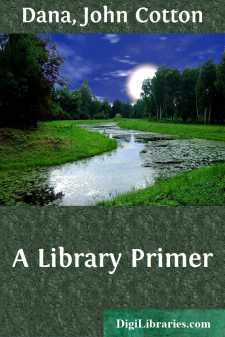Categories
- Antiques & Collectibles 13
- Architecture 36
- Art 48
- Bibles 22
- Biography & Autobiography 813
- Body, Mind & Spirit 142
- Business & Economics 28
- Children's Books 17
- Children's Fiction 14
- Computers 4
- Cooking 94
- Crafts & Hobbies 4
- Drama 346
- Education 46
- Family & Relationships 57
- Fiction 11829
- Games 19
- Gardening 17
- Health & Fitness 34
- History 1377
- House & Home 1
- Humor 147
- Juvenile Fiction 1873
- Juvenile Nonfiction 202
- Language Arts & Disciplines 88
- Law 16
- Literary Collections 686
- Literary Criticism 179
- Mathematics 13
- Medical 41
- Music 40
- Nature 179
- Non-Classifiable 1768
- Performing Arts 7
- Periodicals 1453
- Philosophy 64
- Photography 2
- Poetry 896
- Political Science 203
- Psychology 42
- Reference 154
- Religion 513
- Science 126
- Self-Help 84
- Social Science 81
- Sports & Recreation 34
- Study Aids 3
- Technology & Engineering 59
- Transportation 23
- Travel 463
- True Crime 29
A Library Primer
by: John Cotton Dana
Categories:
Description:
Excerpt
CHAPTER I
The beginnings—Library law
If the establishment of a free public library in your town is under consideration, the first question is probably this: Is there a statute which authorizes a tax for the support of a public library? Your state library commission, if you have one, will tell you if your state gives aid to local public libraries. It will also tell you about your library law. If you have no library commission, consult a lawyer and get from him a careful statement of what can be done under present statutory regulations. If your state has no library law, or none which seems appropriate in your community, it may be necessary to suspend all work, save the fostering of a sentiment favorable to a library, until a good law is secured.
In chapters 44 and 45 will be found a list of state library commissions, important provisions in library laws, and the names of the states having the best library laws at present.
Before taking any definite steps, learn about the beginnings of other libraries by writing to people who have had experience, and especially to libraries in communities similar in size and character to your own. Write to some of the new libraries in other towns and villages of your state, and learn how they began. Visit several such libraries, if possible, the smaller the better if you are starting on a small scale.
CHAPTER II
Preliminary work
Often it is not well to lay great plans and invoke state aid at the very outset. Make a beginning, even though it be small, is a good general rule. This beginning, however petty it seems, will give a center for further effort, and will furnish practical illustrations for the arguments one may wish to use in trying to interest people in the movement.
Each community has different needs, and begins its library under different conditions. Consider then, whether you need most a library devoted chiefly to the work of helping the schools, or one to be used mainly for reference, or one that shall run largely to periodicals and be not much more than a reading room, or one particularly attractive to girls and women, or one that shall not be much more than a cheerful resting-place, attractive enough to draw man and boy from street corner and saloon. Decide this question early, that all effort may be concentrated to one end, and that your young institution may suit the community in which it is to grow, and from which it is to gain its strength.
Having decided to have a library, keep the movement well before the public. The necessity of the library, its great value to the community, should be urged by the local press, from the platform, and in personal talk. Include in your canvass all citizens, irrespective of creed, business, or politics; whether educated or illiterate. Enlist the support of teachers, and through them interest children and parents. Literary, art, social, and scientific societies, Chautauqua circles, local clubs of all kinds should be champions of the movement.
In getting notices of the library's work in the newspapers, or in securing mention of it from the lecture platform, or in clubs, and literary, artistic, and musical societies, it is better to refrain from figures and to deal chiefly in general statements about what the library aims to do and what it has done.
...

